Table of Contents
[OOC] Household Adventures, a Two Little Mice game
- Large Group
- Tabletop
- Fantasy
- Casual
Join Status:
Apply
GM
Fading Memory The Final Flame of a Fiery Bird
Member
Seen
11 hrs ago
Alrighty folks, this post will be seeing much in the way of revision as time goes on. I will be updating it with relevant information and using it as an ongoing log of just what the heck is even going on. Seeing as I've never run the system before, I will be utilizing some of the prewritten material I have in order to facilitate our initial soirees in the House. As such, please do not read through the GM materials in the handbook and quick start guide.
Household is a game told in a 'Saga', the term used for a 'campaign' in this setting and system. Specifically our game will take place within a period of time that will later be known as 'The Fragile Peace'. These years of opened borders and unparalleled Household travel are also years of trouble and highlight the tensions of neighbors who were once foes coming to terms with a world of peace and the struggles therein. Your characters will be the agents in this Saga, experiencing and influencing The Fragile Peace.
A Saga is composed of Chapters, which are themselves composed of Paragraphs. If I were to equate these to more common D&D vernacular, it means that our Campaign is built out of Adventures, which are themselves comprised of Quests. The book has a recommended length of a Saga, but we will go by feeling for our purposes. There is something unique about the presentation of Household that I will discuss, however...
Household encourages changing characters, and having concurrent groupings of Littlings who experience the world simultaneously in different places. I rather enjoy this element to the system, but understand if this does not call to everyone as it does to me. This would allow the players to witness different and potentially far apart sections of the House from fresh sets of eyes, and potentially contribute to the Saga of The Fragile Peace with different perspectives and ideologies without sacrificing one particular group's cohesion or besmirching a character's ideals to do so.
Advancement is tied to progressing along the Saga, particularly concluding a Chapter.
When reaching the end of a Chapter, I will declare that it is time to Advance. When you Advance your character, you will note a new Experience. Experiences represent critical moments of significance to the character, and can be either Helpful or Hindering, but are usually Helpful. 'Scars' are their counterpart, and are usually Hindrances. This, of course, means that situationally they can be the opposite, such is the nature of things.
Typically you will gain one Experience per chapter, but if highly motivating or inspirational things occur during the game I as the GM can bestow additional Experiences. Examples of 'Experiences' are thus;
I climbed the Great Stairs!
I became a Parent.
I was in prison.
I broke a leg.
I can't trust anyone anymore.
My sister is the best.
My gecko will never leave me.
so on and so forth; the relevance will come from the events in character and will motivate your decisions on what Experience best defines their time in the Chapter.
Somewhat more mechanically inclined, Advancement also comes with gaining 2 Skill Points to distribute, and occasionally the opportunity to learn new Moves or gain Traits (read: D&D Feats).
Another extraordinarily important thing to explain is Littlings and their Contractual Obligations. Contracts are important to the Little Folk, and everything in the house is defined by Contracts and their concessions by the Forces or their representatives. The Forces are virtually any natural force or concept, and in my eyes they are held to a level that most settings would call deities. All the Littlings are bound by contracts, ranging from their Hereditary contracts which define individual Folk-Type bindings and benefits, to Personal Contracts which are individual Littlings gaining unique favor with one Force or another.
Contracts are defined by Concessions and Counterparts. Concessions are what the Force is bestowing upon the character, whilst Counterparts are the behaviors or services expected of the character. Breaking a contract results in Terrible Terrible Things (TTT's). The three primary types of Contracts are the Hereditary, which bind all Folk-types by their strictures, the Personal, which are individual remarkable contracts granted by the Forces, and Welcoming, which permit entry into otherwise unpassable locales or destinations-- such as the fireplace, where a Littling may otherwise burn up!

Hereditary Contracts represent a character's forebears making a deal with one of the Household Forces. The principal contracts are thus;
Fairy - Contract of the Starchild
-The Starchild contract is what bestows the Fairies their remarkable wings. In return for this incredible boon, all Fairies are bound by their names; any agreement signed by name must be obeyed, lest they suffer TTT's.
Boggart - Dear to the Hearth
-The Hearth bestows upon Boggarts the strength of one hundred littlings. They can temporarily 'Go Juggernaut', growing greatly in size (up to double their ordinary and typically already daunting size) and gain immense physical prowess for the time. This wears them down somewhat when it wears off, and usually results in a loss of Decorum due to ripped clothing, but their true Counterpart is being bound by their word; Boggarts must always honor their word, lest they suffer TTT's
Sprites
Salamander - Out of the Spark
-Salamanders are granted Enlightenment by their contract with the Spark; they can glow bioluminescently from their hands, feet, and nose. Yes, they can 'turn this off and on'. Additionally they will receive epiphanies and flashes of inspiration from time to time.
Sylph - Out of the Draft
-Sylphs are bestowed a legendary Lightness by the Draft; they have hollow bones, long and slender, and as such they walk so lightly as to not even disturb dust in their passing. By holding their breath they may 'bloat' for a short period of time, further enhancing their already natural weightlessness.
Undine - Out of the Drain
-Undine are bestowed Water Retention by their contract; their bodies absorb water like great sponges, and as such they are incredibly durable and hardy to the point of even withstanding incredible falls. Mighty blows that would fell other Folk simply cause Undine to swiftly lose their stored water and become disheveled.
Sprites all share the same Counterpart. All Sprites are bound by deals negotiated and sealed with payment. Should they fail to obey this, they will suffer TTT's
Sluagh - Revenant from Farbeyond
-Bestowed by the unknowable Forces of the Farbeyond, Sluagh are granted the benefits of being Unbleeding; their blood is dense, dark, and flows slowly- but is possessed of incredible healing factors. As such, Sluagh are naturally resistant to poisons and drunkenness, and can withstand otherwise lethal blows; a duel to last blood is not something that fazes Sluagh duelists, who can outlast many foes. All Sluagh are bound by their debts, however; any agreement bound by a lost bet must be obeyed lest a Sluagh suffer TTT's
The House itself is a wonder, built by the Master for his Family. It has been many years since the Master walked the halls of the House, however, and no Littling has the strength to master the House itself. A such, the House's exact proportions are unknowable. The greatest of scholars have theorized that a great contract binds the domain of the House, and as such locations within the House are mysteriously perceived in warped measurements. A common example of this is a City within a Drawer; once you enter into the city, the expanse may exceed the literal confines of the Drawer as measured from outside. This phenomenon is noted in many places in the House, and is functionally the game's way of going 'things are as big or as small as they need to be for the importance in the story'. I dig this part. It even notes that the Dining Table's surface is often measured to exceed the area between the four legs of the table, which causes no end of bickering among scholars who try to explain this phenomenon beyond the conventional assumption of a Contract.

Trust a sprite if you pay them
A boggart if they give their word
A fairy if they sign their name
And a sluagh when they say
“you should never trust me”
Household Proverb
The core mechanic of the game is pairing 'Fields' with 'Skills' to amass a die pool, then rolling and searching for matching sets of results. This is where player agency shines, as you get to decide how your character is approaching a scene or obstacle and pitch it to the GM (There would rarely be a situation where I would feel the need to arbitrate these decisions).
There are four fields (Society, Academia, War, and Street), and twenty skills. On the character sheet they are grouped by typical associations, but this is not a restrictive grouping.

When an action carries a risk, or when it can lead to important Consequences that would influence the development of the story, then it’s time for you to roll the dice.
There are two kinds of dice rolls in this game:
Ӵ ACTION ROLLS: For these rolls, you are the one who states the Action, and you can freely choose the Field and Skill you’ll call into play.
Ӵ REACTION ROLLS: For these rolls, the Narrator asks you to React to a specific event, calling into play a specific Field and Skill
you could approach a situation by trying to be stealthy, warranting a Street+Caution to sneak and bypass hostile presences, or perhaps in a party you may be trying to fly under the radar whilst remaining present on the ballroom floor and that would fall under Society+Caution. A situation of a precarious alchemical laboratory in the midst of a firefight requiring you to juggle reagents and components? Could just as easily be Academia+Craft as it could Academia+Dexterity to avoid cataclysm. This is the primary interface with which the players interact with the world, by choosing a Field and Skill, justifying the choice, then rolling the dice and acting out the results.
The difficulty of these actions is decided by the GM, ranging from 'Basic' to 'Impossible' (one pair to five of a kind), but there are nuances to these rolls and your ability to interact with them, but that can be delved into later if folks are still interested in this game. 'Critical', AKA Three of a Kind, is the 'standard' difficulty to be expected for most tasks that are worth rolling for. If you somehow roll 6 of a kind, that's called a 'Jackpot' and it basically allows you to take over the narration of the scene as a whole and describe how you achieve your goal for the scene. Hey, it gives me a break as GM, I'm all for it.
Reaction rolls are similar to Action rolls, except that I, the mighty GM, would dictate what roll is appropriate for the declared action. This comes up in Combat, unexpected circumstances, emergencies, and otherwise dramatic moments. Enemies do not roll to hit you; you will be called on to React to them, as deemed appropriate by the GM, to avoid harm and embarassment.
The core mechanic of interaction with rolls is 'Rerolls' and 'Free Rerolls', which all I'll elaborate on for now is that you can risk what you currently have to try and improve the result- unless it's 'Free', in which case always take your reroll as it cannot harm you!
Characters will have access to specialized maneuvers called 'Moves' which give them unique abilities or access to 'Free Rerolls'; think of these like Feats in D&D.
Instead of tracking HP you have 'Stress', and it acts as plot armor, social graces, physical might, whatever you need to fluff it as to understand this system is an abstract and simple portrayal of the heroics and struggles of these little folk. Taking too much 'Stress' results in becoming Overstressed, and risking 'Bowing Out' of the scene- the game does not overtly risk death upon anyone without their consent outside of few remarkable circumstances. Situationally you may suffer 'Conditions', which modify die pools in relevant fashions. Becoming Hurt, for example, makes it harder to wield your War field and imposes maluses on your physical efforts.
There are some other nuances and mechanics, and a limited method of advancement, but this covers the 'mechanics' of Household to an extent that it should help you decide if this style of gameplay seems fun to y'all.
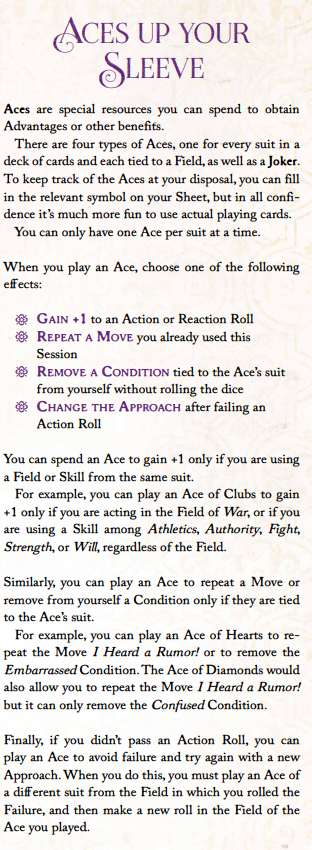

The rules for Dueling will be screenshotted below for easy reference. The DM has a few optional rules to make use of to add diversity to duels, and they will be utilized as they arise.

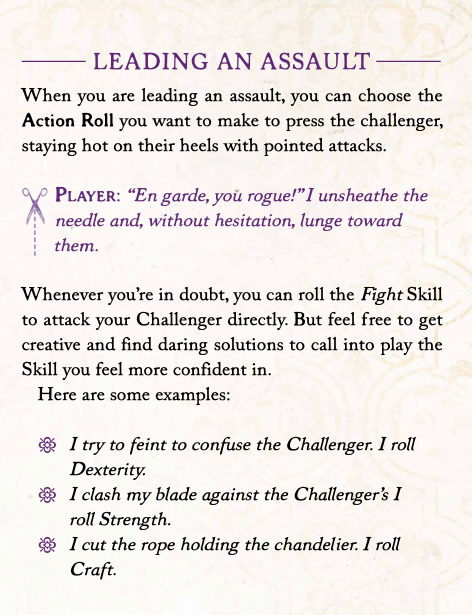
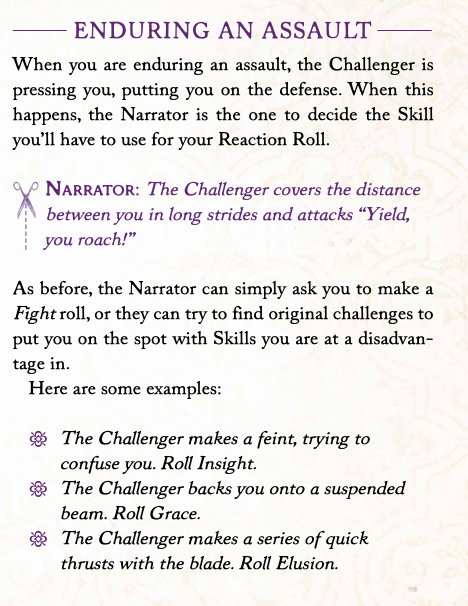
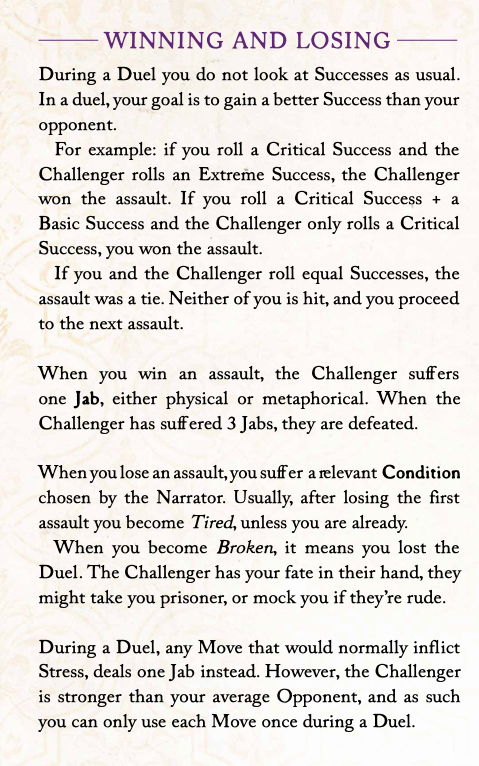
Battle is not solely the domain of the powerful scissors-for-hire or thugs of the Household, and the quick-witted or conniving can find ample room to turn the tide against a party's foes with their intellect or schemes. This is where 'Weak Spots' come in.
To keep this abundantly clear, each Opponent can only have ONE weak spot, and it can only be taken advantage of ONCE. They are a diverse and potentially very powerful tool. The rule for discerning weak spots will be screenshotted below, and for the sake of clear mechanical expectations I will state that Weak Spots are randomly determined by a series of tables upon a Littling searching for one.

A brawl is like a Combat, but for Littlings to duke things out with Fisticuffs! To keep it simple, a Brawl uses mostly the same rules as a typical conflict, except that it is solely meant for outright unarmed brawls of the chaotic, tavern-sprawling, nature. Once someone dares to draw a true weapon, the typical combat rules take precedence once again and will ensue from that point forward.
In a Brawl, the exception to the standard rules is that regardless of Action or Reaction turns, on successful rolls you will inflict Stress on the opponent, and on failed rolls you will suffer the stress. Brawls are a chaotic, sometimes senseless, flurry of blows!
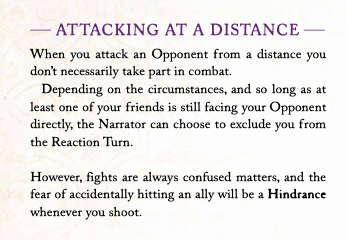
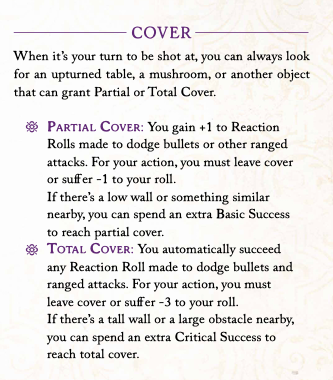
These mechanics are similar but subtly different. Making a Trade is an opportunity for you, the player, to suggest a reasonable alternative to suffering Stress for GM approval. Reducing decorum, a stray bullet catching your coin pouch, breaking a favored piece of equipment, suffering a condition, etc., are all examples of 'making a trade' with the GM. As always, the GM has final say on whether or not they accept the trade.
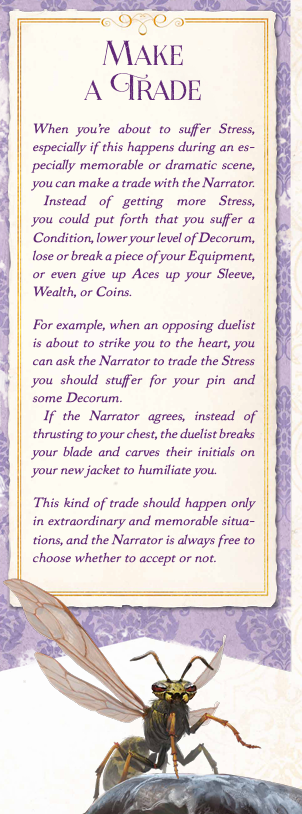
Raising the Stakes, on the other hand, is a bargain offered by the GM. You may at some time succeed on a roll; as strange as this may sound, it is bound to happen. Occasionally the GM may attempt to entice you into a reroll, trying to improve your result, with a bribe of additional information, improved outcome, or other favorable circumstances. Perhaps you succeeded in your bribe, but the GM offers 'Let's raise the stakes; if you reroll and improve your result, you will learn something from the disgruntled guard about their boss'. Whether you accept such stakes is up to you; failure will result in losing your already earned success!
This one is rather simple; to leave a combat situation, you roll Elusion+War against the Opponent Difficulty. If you're the LAST person to leave, you get a -1 to your roll! Sometimes holding the line can be difficult, after all.
Brief Summary and description of the Demesne Contract here.
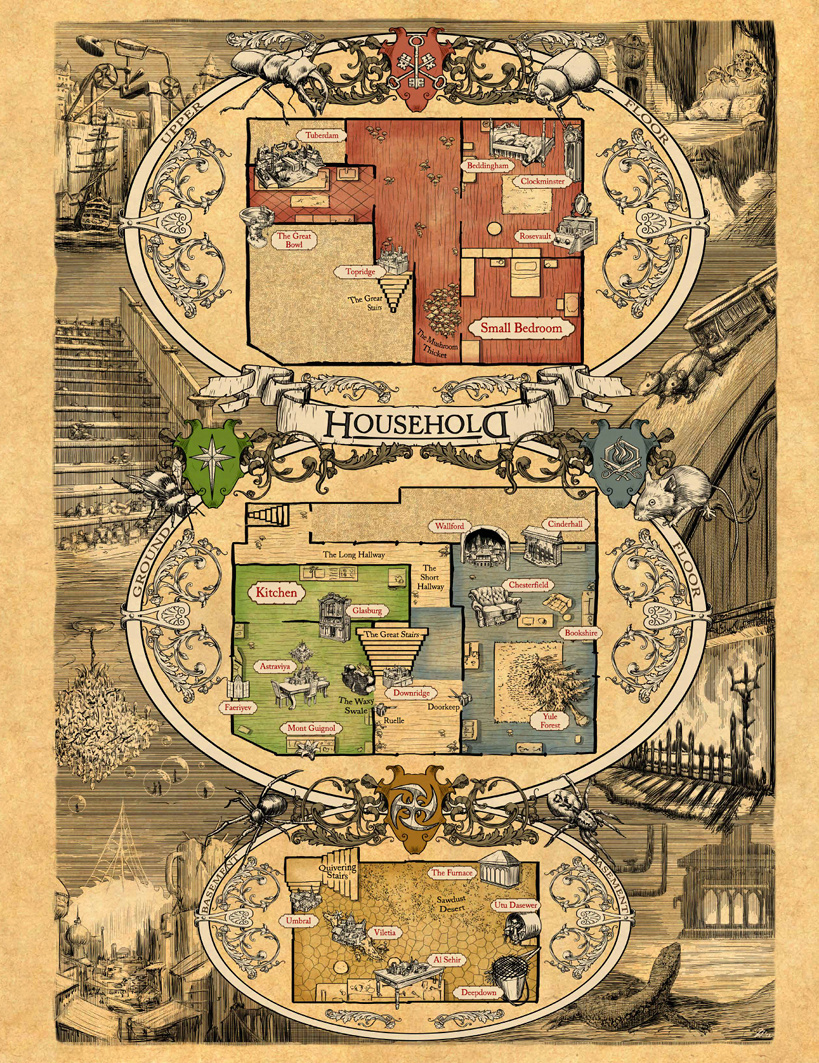
There is a timeline, various maps, and detailed historical/cultural artifacts to each of the nations, major cities, and the Folk of the House. I will elaborate on what I feel is necessary as time passes, but for now this will be the launch of the OOC as I shuffle the character materials to all those interested.
Saga Structure
Household is a game told in a 'Saga', the term used for a 'campaign' in this setting and system. Specifically our game will take place within a period of time that will later be known as 'The Fragile Peace'. These years of opened borders and unparalleled Household travel are also years of trouble and highlight the tensions of neighbors who were once foes coming to terms with a world of peace and the struggles therein. Your characters will be the agents in this Saga, experiencing and influencing The Fragile Peace.
A Saga is composed of Chapters, which are themselves composed of Paragraphs. If I were to equate these to more common D&D vernacular, it means that our Campaign is built out of Adventures, which are themselves comprised of Quests. The book has a recommended length of a Saga, but we will go by feeling for our purposes. There is something unique about the presentation of Household that I will discuss, however...
Household encourages changing characters, and having concurrent groupings of Littlings who experience the world simultaneously in different places. I rather enjoy this element to the system, but understand if this does not call to everyone as it does to me. This would allow the players to witness different and potentially far apart sections of the House from fresh sets of eyes, and potentially contribute to the Saga of The Fragile Peace with different perspectives and ideologies without sacrificing one particular group's cohesion or besmirching a character's ideals to do so.
Advancement is tied to progressing along the Saga, particularly concluding a Chapter.
Advancement
When reaching the end of a Chapter, I will declare that it is time to Advance. When you Advance your character, you will note a new Experience. Experiences represent critical moments of significance to the character, and can be either Helpful or Hindering, but are usually Helpful. 'Scars' are their counterpart, and are usually Hindrances. This, of course, means that situationally they can be the opposite, such is the nature of things.
Typically you will gain one Experience per chapter, but if highly motivating or inspirational things occur during the game I as the GM can bestow additional Experiences. Examples of 'Experiences' are thus;
I climbed the Great Stairs!
I became a Parent.
I was in prison.
I broke a leg.
I can't trust anyone anymore.
My sister is the best.
My gecko will never leave me.
so on and so forth; the relevance will come from the events in character and will motivate your decisions on what Experience best defines their time in the Chapter.
Somewhat more mechanically inclined, Advancement also comes with gaining 2 Skill Points to distribute, and occasionally the opportunity to learn new Moves or gain Traits (read: D&D Feats).
Another extraordinarily important thing to explain is Littlings and their Contractual Obligations. Contracts are important to the Little Folk, and everything in the house is defined by Contracts and their concessions by the Forces or their representatives. The Forces are virtually any natural force or concept, and in my eyes they are held to a level that most settings would call deities. All the Littlings are bound by contracts, ranging from their Hereditary contracts which define individual Folk-Type bindings and benefits, to Personal Contracts which are individual Littlings gaining unique favor with one Force or another.
Contracts
Contracts are defined by Concessions and Counterparts. Concessions are what the Force is bestowing upon the character, whilst Counterparts are the behaviors or services expected of the character. Breaking a contract results in Terrible Terrible Things (TTT's). The three primary types of Contracts are the Hereditary, which bind all Folk-types by their strictures, the Personal, which are individual remarkable contracts granted by the Forces, and Welcoming, which permit entry into otherwise unpassable locales or destinations-- such as the fireplace, where a Littling may otherwise burn up!

Hereditary Contracts represent a character's forebears making a deal with one of the Household Forces. The principal contracts are thus;
Fairy - Contract of the Starchild
-The Starchild contract is what bestows the Fairies their remarkable wings. In return for this incredible boon, all Fairies are bound by their names; any agreement signed by name must be obeyed, lest they suffer TTT's.
Boggart - Dear to the Hearth
-The Hearth bestows upon Boggarts the strength of one hundred littlings. They can temporarily 'Go Juggernaut', growing greatly in size (up to double their ordinary and typically already daunting size) and gain immense physical prowess for the time. This wears them down somewhat when it wears off, and usually results in a loss of Decorum due to ripped clothing, but their true Counterpart is being bound by their word; Boggarts must always honor their word, lest they suffer TTT's
Sprites
Salamander - Out of the Spark
-Salamanders are granted Enlightenment by their contract with the Spark; they can glow bioluminescently from their hands, feet, and nose. Yes, they can 'turn this off and on'. Additionally they will receive epiphanies and flashes of inspiration from time to time.
Sylph - Out of the Draft
-Sylphs are bestowed a legendary Lightness by the Draft; they have hollow bones, long and slender, and as such they walk so lightly as to not even disturb dust in their passing. By holding their breath they may 'bloat' for a short period of time, further enhancing their already natural weightlessness.
Undine - Out of the Drain
-Undine are bestowed Water Retention by their contract; their bodies absorb water like great sponges, and as such they are incredibly durable and hardy to the point of even withstanding incredible falls. Mighty blows that would fell other Folk simply cause Undine to swiftly lose their stored water and become disheveled.
Sprites all share the same Counterpart. All Sprites are bound by deals negotiated and sealed with payment. Should they fail to obey this, they will suffer TTT's
Sluagh - Revenant from Farbeyond
-Bestowed by the unknowable Forces of the Farbeyond, Sluagh are granted the benefits of being Unbleeding; their blood is dense, dark, and flows slowly- but is possessed of incredible healing factors. As such, Sluagh are naturally resistant to poisons and drunkenness, and can withstand otherwise lethal blows; a duel to last blood is not something that fazes Sluagh duelists, who can outlast many foes. All Sluagh are bound by their debts, however; any agreement bound by a lost bet must be obeyed lest a Sluagh suffer TTT's
The House
The House itself is a wonder, built by the Master for his Family. It has been many years since the Master walked the halls of the House, however, and no Littling has the strength to master the House itself. A such, the House's exact proportions are unknowable. The greatest of scholars have theorized that a great contract binds the domain of the House, and as such locations within the House are mysteriously perceived in warped measurements. A common example of this is a City within a Drawer; once you enter into the city, the expanse may exceed the literal confines of the Drawer as measured from outside. This phenomenon is noted in many places in the House, and is functionally the game's way of going 'things are as big or as small as they need to be for the importance in the story'. I dig this part. It even notes that the Dining Table's surface is often measured to exceed the area between the four legs of the table, which causes no end of bickering among scholars who try to explain this phenomenon beyond the conventional assumption of a Contract.
Mechanics

Trust a sprite if you pay them
A boggart if they give their word
A fairy if they sign their name
And a sluagh when they say
“you should never trust me”
Household Proverb
The core mechanic of the game is pairing 'Fields' with 'Skills' to amass a die pool, then rolling and searching for matching sets of results. This is where player agency shines, as you get to decide how your character is approaching a scene or obstacle and pitch it to the GM (There would rarely be a situation where I would feel the need to arbitrate these decisions).
There are four fields (Society, Academia, War, and Street), and twenty skills. On the character sheet they are grouped by typical associations, but this is not a restrictive grouping.

When an action carries a risk, or when it can lead to important Consequences that would influence the development of the story, then it’s time for you to roll the dice.
There are two kinds of dice rolls in this game:
Ӵ ACTION ROLLS: For these rolls, you are the one who states the Action, and you can freely choose the Field and Skill you’ll call into play.
Ӵ REACTION ROLLS: For these rolls, the Narrator asks you to React to a specific event, calling into play a specific Field and Skill
you could approach a situation by trying to be stealthy, warranting a Street+Caution to sneak and bypass hostile presences, or perhaps in a party you may be trying to fly under the radar whilst remaining present on the ballroom floor and that would fall under Society+Caution. A situation of a precarious alchemical laboratory in the midst of a firefight requiring you to juggle reagents and components? Could just as easily be Academia+Craft as it could Academia+Dexterity to avoid cataclysm. This is the primary interface with which the players interact with the world, by choosing a Field and Skill, justifying the choice, then rolling the dice and acting out the results.
The difficulty of these actions is decided by the GM, ranging from 'Basic' to 'Impossible' (one pair to five of a kind), but there are nuances to these rolls and your ability to interact with them, but that can be delved into later if folks are still interested in this game. 'Critical', AKA Three of a Kind, is the 'standard' difficulty to be expected for most tasks that are worth rolling for. If you somehow roll 6 of a kind, that's called a 'Jackpot' and it basically allows you to take over the narration of the scene as a whole and describe how you achieve your goal for the scene. Hey, it gives me a break as GM, I'm all for it.
Reaction rolls are similar to Action rolls, except that I, the mighty GM, would dictate what roll is appropriate for the declared action. This comes up in Combat, unexpected circumstances, emergencies, and otherwise dramatic moments. Enemies do not roll to hit you; you will be called on to React to them, as deemed appropriate by the GM, to avoid harm and embarassment.
The core mechanic of interaction with rolls is 'Rerolls' and 'Free Rerolls', which all I'll elaborate on for now is that you can risk what you currently have to try and improve the result- unless it's 'Free', in which case always take your reroll as it cannot harm you!
Characters will have access to specialized maneuvers called 'Moves' which give them unique abilities or access to 'Free Rerolls'; think of these like Feats in D&D.
Instead of tracking HP you have 'Stress', and it acts as plot armor, social graces, physical might, whatever you need to fluff it as to understand this system is an abstract and simple portrayal of the heroics and struggles of these little folk. Taking too much 'Stress' results in becoming Overstressed, and risking 'Bowing Out' of the scene- the game does not overtly risk death upon anyone without their consent outside of few remarkable circumstances. Situationally you may suffer 'Conditions', which modify die pools in relevant fashions. Becoming Hurt, for example, makes it harder to wield your War field and imposes maluses on your physical efforts.
There are some other nuances and mechanics, and a limited method of advancement, but this covers the 'mechanics' of Household to an extent that it should help you decide if this style of gameplay seems fun to y'all.
In this hypothetical, my Boggart by the name of Eniston Poglwogl, is attempting to sneak past some gendarmes who are in an offensive patrol arc around my intended heist target. I shall take my hypothetical Street field of 2 and my hypothetical Elusion skill of 3, and shove them together to make a pool of 5 dice. My GM tells me the difficulty of the test is Critical [three of a kind].
I roll the dice, and get two pairs (two basic successes)
This is not enough to reach the threshold of a Critical difficulty, and as such there will be consequences for Eniston Poglwogl in this situation- although my two basic successes may situationally still permit certain benefits, such as declaring I reached certain positions before I got caught. I have scored at least a Basic Success (one pair), therefor I have the opportunity to Reroll. As I have no sources of a 'Free Reroll', I will gamble with the normal Reroll; roll all non-matched dice again, but if I do not improve my result I will lose one of my current successes. Seeing as the GM was generous enough to let me know the difficulty ahead of time, I know I may as well gamble on this one. Thus I reroll my singular failed die;
the 6 became a 2, my success does not improve and I lose one of my basic Successes.
Eniston is caught out in the open, tripping over his own untied shoelaces and into the sight of the gendarme, but managed to regain footing and break into a run to gain some distance before the guard managed to blow their whistle.
This is just one simple example of how the dice mechanics can function.
I roll the dice, and get two pairs (two basic successes)
This is not enough to reach the threshold of a Critical difficulty, and as such there will be consequences for Eniston Poglwogl in this situation- although my two basic successes may situationally still permit certain benefits, such as declaring I reached certain positions before I got caught. I have scored at least a Basic Success (one pair), therefor I have the opportunity to Reroll. As I have no sources of a 'Free Reroll', I will gamble with the normal Reroll; roll all non-matched dice again, but if I do not improve my result I will lose one of my current successes. Seeing as the GM was generous enough to let me know the difficulty ahead of time, I know I may as well gamble on this one. Thus I reroll my singular failed die;
the 6 became a 2, my success does not improve and I lose one of my basic Successes.
Eniston is caught out in the open, tripping over his own untied shoelaces and into the sight of the gendarme, but managed to regain footing and break into a run to gain some distance before the guard managed to blow their whistle.
This is just one simple example of how the dice mechanics can function.
Conflict comes in various forms. Mechanically, these situations will hold to the same Action or Reaction roll system the rest of the game is built upon.

As described above, conflicts come in many shapes and sizes- and explicit combat is not the only way for a Littling to suffer stress! Generally Conflicts will operate in 'Turns', situationally favoring the Players or the Opposition. If the circumstances favor the Players, all the Littlings will get an opportunity to begin the Conflict with an Action; otherwise Conflict will begin with a Reaction phase dictated by the GM.
This system does not use Initiative, nor hard turn orders, or anything of the sort. Nor does the GM track specific opposition stats or stress or actions. The exception to this is Duels, which will be described separately.
Unless otherwise stated by the GM, Combat will be handled by summing the opposition into a group. I may describe a literal number, such as ten or five or fifteen, deserters; this is largely mechanically irrelevant. The ability to narrate and fluff as you desire within the prescribed environment is shared between the players and the GM once the outlines are established, and dictated by the die rolls. This means that if our party ends up in an ambush of ten deserters, all players are functionally attacking the same mechanical entity; 'The deserters' share stress and exist as a narrative tool for the GM to impose Reaction Rolls onto the players. Sometimes a single entity, such as a spider, or a centipede, or a particularly noteworthy duelist, could even constitute the same combat circumstance!
In Combat, all Actions and Reaction rolls use the War Field
Eniston Poglwogl, Boggart Thief, is accompanied by Verafina Nightshade, a Sluagh huntress, and Ace of Spades, a Fairy scissor-for-hire. Eniston previously failed to sneak past the gendarmerie to reach his goal, and is thinking through a new plan with clues discovered by Verafina separate to his own escapades. Their camp is suddenly surrounded in the night; twelve dirty and poorly armed deserters are trying to make a move.
Because of this ambush scenario, our Littles were poor in setting up camp and did not keep a watch, the Combat begins with a Reaction. Based on the traits and abilities the GM has decided upon for these deserters, the Littles need Critical Successes to avoid harm in this initial ambush. The GM describes how the deserters act, and dictate the Reactions needed to avoid harm to each Player;
Eniston's reputation as a scrappy brawler precedes him, and so the deserters wield their few firearms in an opening fusillade against the players. The GM calls for War+Athletics to swiftly seek cover against the hail of fire. This is a decent pool for the scrappy Boggart, but a poor pool for the roguish Ace of Spades, whilst Verafina has a favorable pool for this roll.
All three players roll and seek a Critical Success (three of a kind). After pursuing rerolls and making use of traits or Aces, Eniston gets two basic successes (two pairs), Ace of Spades rolls his comparatively small pool and only gets one basic success (one pair), whereas Verafina is extremely lucky and rolls two critical successes (two three-of-a-kind rolls).
Verafina has scored sufficient 'additional successes' to share in the wealth with her companions; she decides to spend her extra Critical success protecting Ace of Spades as well. She describes how she weaves through the gunfire elegantly, before reaching out and pulling Ace of Spades out of the way of harm entirely. Her shared success mitigated the harm coming towards both of them.
Eniston, however, did not achieve a full success. Failing a Critical Reaction roll typically results in suffering 3 Stress, however he rolled two basic successes. He may mitigate the damage suffered with this; Eniston describes how as the first shot takes him low in the arm, he dives to the side and runs into the mushroom thicket for cover. He only suffers 1 Stress instead of the full 3, his lesser successes reducing the threat.
It is now the Players turn to Act, and Eniston gleefully describes as he Goes Juggernaut... The deserters may have chosen the wrong travelers to ambush!
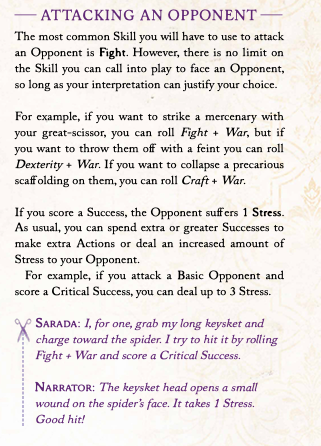

As described above, conflicts come in many shapes and sizes- and explicit combat is not the only way for a Littling to suffer stress! Generally Conflicts will operate in 'Turns', situationally favoring the Players or the Opposition. If the circumstances favor the Players, all the Littlings will get an opportunity to begin the Conflict with an Action; otherwise Conflict will begin with a Reaction phase dictated by the GM.
This system does not use Initiative, nor hard turn orders, or anything of the sort. Nor does the GM track specific opposition stats or stress or actions. The exception to this is Duels, which will be described separately.
Unless otherwise stated by the GM, Combat will be handled by summing the opposition into a group. I may describe a literal number, such as ten or five or fifteen, deserters; this is largely mechanically irrelevant. The ability to narrate and fluff as you desire within the prescribed environment is shared between the players and the GM once the outlines are established, and dictated by the die rolls. This means that if our party ends up in an ambush of ten deserters, all players are functionally attacking the same mechanical entity; 'The deserters' share stress and exist as a narrative tool for the GM to impose Reaction Rolls onto the players. Sometimes a single entity, such as a spider, or a centipede, or a particularly noteworthy duelist, could even constitute the same combat circumstance!
In Combat, all Actions and Reaction rolls use the War Field
Eniston Poglwogl, Boggart Thief, is accompanied by Verafina Nightshade, a Sluagh huntress, and Ace of Spades, a Fairy scissor-for-hire. Eniston previously failed to sneak past the gendarmerie to reach his goal, and is thinking through a new plan with clues discovered by Verafina separate to his own escapades. Their camp is suddenly surrounded in the night; twelve dirty and poorly armed deserters are trying to make a move.
Because of this ambush scenario, our Littles were poor in setting up camp and did not keep a watch, the Combat begins with a Reaction. Based on the traits and abilities the GM has decided upon for these deserters, the Littles need Critical Successes to avoid harm in this initial ambush. The GM describes how the deserters act, and dictate the Reactions needed to avoid harm to each Player;
Eniston's reputation as a scrappy brawler precedes him, and so the deserters wield their few firearms in an opening fusillade against the players. The GM calls for War+Athletics to swiftly seek cover against the hail of fire. This is a decent pool for the scrappy Boggart, but a poor pool for the roguish Ace of Spades, whilst Verafina has a favorable pool for this roll.
All three players roll and seek a Critical Success (three of a kind). After pursuing rerolls and making use of traits or Aces, Eniston gets two basic successes (two pairs), Ace of Spades rolls his comparatively small pool and only gets one basic success (one pair), whereas Verafina is extremely lucky and rolls two critical successes (two three-of-a-kind rolls).
Verafina has scored sufficient 'additional successes' to share in the wealth with her companions; she decides to spend her extra Critical success protecting Ace of Spades as well. She describes how she weaves through the gunfire elegantly, before reaching out and pulling Ace of Spades out of the way of harm entirely. Her shared success mitigated the harm coming towards both of them.
Eniston, however, did not achieve a full success. Failing a Critical Reaction roll typically results in suffering 3 Stress, however he rolled two basic successes. He may mitigate the damage suffered with this; Eniston describes how as the first shot takes him low in the arm, he dives to the side and runs into the mushroom thicket for cover. He only suffers 1 Stress instead of the full 3, his lesser successes reducing the threat.
It is now the Players turn to Act, and Eniston gleefully describes as he Goes Juggernaut... The deserters may have chosen the wrong travelers to ambush!

Aces and Jokers


Duels
The rules for Dueling will be screenshotted below for easy reference. The DM has a few optional rules to make use of to add diversity to duels, and they will be utilized as they arise.




Weak Spots
Battle is not solely the domain of the powerful scissors-for-hire or thugs of the Household, and the quick-witted or conniving can find ample room to turn the tide against a party's foes with their intellect or schemes. This is where 'Weak Spots' come in.
To keep this abundantly clear, each Opponent can only have ONE weak spot, and it can only be taken advantage of ONCE. They are a diverse and potentially very powerful tool. The rule for discerning weak spots will be screenshotted below, and for the sake of clear mechanical expectations I will state that Weak Spots are randomly determined by a series of tables upon a Littling searching for one.

Brawls!
A brawl is like a Combat, but for Littlings to duke things out with Fisticuffs! To keep it simple, a Brawl uses mostly the same rules as a typical conflict, except that it is solely meant for outright unarmed brawls of the chaotic, tavern-sprawling, nature. Once someone dares to draw a true weapon, the typical combat rules take precedence once again and will ensue from that point forward.
In a Brawl, the exception to the standard rules is that regardless of Action or Reaction turns, on successful rolls you will inflict Stress on the opponent, and on failed rolls you will suffer the stress. Brawls are a chaotic, sometimes senseless, flurry of blows!
Ranged Combat and Cover


Making a Trade and Raising the Stakes
These mechanics are similar but subtly different. Making a Trade is an opportunity for you, the player, to suggest a reasonable alternative to suffering Stress for GM approval. Reducing decorum, a stray bullet catching your coin pouch, breaking a favored piece of equipment, suffering a condition, etc., are all examples of 'making a trade' with the GM. As always, the GM has final say on whether or not they accept the trade.

Raising the Stakes, on the other hand, is a bargain offered by the GM. You may at some time succeed on a roll; as strange as this may sound, it is bound to happen. Occasionally the GM may attempt to entice you into a reroll, trying to improve your result, with a bribe of additional information, improved outcome, or other favorable circumstances. Perhaps you succeeded in your bribe, but the GM offers 'Let's raise the stakes; if you reroll and improve your result, you will learn something from the disgruntled guard about their boss'. Whether you accept such stakes is up to you; failure will result in losing your already earned success!
Leaving Combat
This one is rather simple; to leave a combat situation, you roll Elusion+War against the Opponent Difficulty. If you're the LAST person to leave, you get a -1 to your roll! Sometimes holding the line can be difficult, after all.
Setting and Map; The House
Brief Summary and description of the Demesne Contract here.

Yep.
Uh-huh.
There is a timeline, various maps, and detailed historical/cultural artifacts to each of the nations, major cities, and the Folk of the House. I will elaborate on what I feel is necessary as time passes, but for now this will be the launch of the OOC as I shuffle the character materials to all those interested.
rush99999 Professional Oddball
Member
Seen
19 min ago
I believe that my Characters shall be a Salamander scientist, a Boggart barbarian, a Fairy financier, and a Slaugh spy.
1x Laugh


rush99999 Professional Oddball
Member
Seen
19 min ago
According to the rules, I need an ok from both the other Players and the Narrator if I want to play a Character who starts off as Rich.
So would it be ok if my Fairy financier started the game as a Rich Character?
So would it be ok if my Fairy financier started the game as a Rich Character?
XxFellsingxX Your Own Portable Ninja Friend
Member
Seen
0-24 hrs ago

According to the rules, I need an ok from both the other Players and the Narrator if I want to play a Character who starts off as Rich.
So would it be ok if my Fairy financier started the game as a Rich Character?
It's cool with me.
1x Like


XxFellsingxX Your Own Portable Ninja Friend
Member
Seen
0-24 hrs ago

So I'm guessing we're having four characters each, one for of the nations?
One of my characters is definitely a sluagh detective, I'm telling you all now.
One of my characters is definitely a sluagh detective, I'm telling you all now.
GM
Fading Memory The Final Flame of a Fiery Bird
Member
Seen
11 hrs ago
I’m personally happy with the idea of making a character in each nation, it would easily facilitate the potential PoV shifting of chapters.
I also do not personally find there to be an issue with starting Rich, but I’ll flip back through the sections when I have a chance to double check.
I also do not personally find there to be an issue with starting Rich, but I’ll flip back through the sections when I have a chance to double check.
rush99999 Professional Oddball
Member
Seen
19 min ago
I’m personally happy with the idea of making a character in each nation, it would easily facilitate the potential PoV shifting of chapters.
Would you be ok with people doing something different? Because so far I was planning on having two Characters in the Free Dominions, one Character in the Realm, and one Character a be wanderer who doesn't stay in one place for too long.
GM
Fading Memory The Final Flame of a Fiery Bird
Member
Seen
11 hrs ago
To clarify, a Littlings Origin is not necessarily where they will start their on-screen adventure. Additionally, while the Folk do have common origins that is not restrictive. Sluagh could be from the Realm, or a Boggart from the Free Dominions, etc.
As an additional clarification, if everyone enjoys the idea of the concurrent PoV shifting, I will likely advertise a brief summary of the initial chapters I have in mind once we finish the quick start/GM’s First Adventure module so people can decide which group their particular Littlings probably fit into.
As for the perceived question of ‘multiple characters at one time’, I will think on it but will generally leave that up to the group itself for this medium. If the overall player count becomes above 5 I will have to say at that point I’d prefer if everyone were only playing one Littling per Chapter, as the large group size requires an adjustment of prep work, but below that number it should not be an issue. (And just to make it clear, I’m happy to have a large group- just once we get above 5 Littles I need to start making special adjustments)
As an additional clarification, if everyone enjoys the idea of the concurrent PoV shifting, I will likely advertise a brief summary of the initial chapters I have in mind once we finish the quick start/GM’s First Adventure module so people can decide which group their particular Littlings probably fit into.
As for the perceived question of ‘multiple characters at one time’, I will think on it but will generally leave that up to the group itself for this medium. If the overall player count becomes above 5 I will have to say at that point I’d prefer if everyone were only playing one Littling per Chapter, as the large group size requires an adjustment of prep work, but below that number it should not be an issue. (And just to make it clear, I’m happy to have a large group- just once we get above 5 Littles I need to start making special adjustments)
2x Thank


GM
Fading Memory The Final Flame of a Fiery Bird
Member
Seen
11 hrs ago
@rush99999 I have reread through things, and in particular because the trade requires you to give up other starting resources I do not mind seeing a rich character or two pop up across the full cast.
I have, in essence, completed my mechanical refresher. There are subtle differences from their other system, Outgunned, but it largely functions the same. I am now focusing on absorbing setting information and will work on getting what I consider to be important compiled for the OOC, and will then post a summary/pitch of the 'quick-start' adventure so that folks can decide up on a Little for that endeavor.
I have, in essence, completed my mechanical refresher. There are subtle differences from their other system, Outgunned, but it largely functions the same. I am now focusing on absorbing setting information and will work on getting what I consider to be important compiled for the OOC, and will then post a summary/pitch of the 'quick-start' adventure so that folks can decide up on a Little for that endeavor.
2x Like


GM
Fading Memory The Final Flame of a Fiery Bird
Member
Seen
11 hrs ago
I will add this to the 0th post, as this will be the initial hook and 'chapter' we use to test out our interests in the system. I will continue absorbing setting information and trying to compile the basics for ease of access here on the guild.
Do folks want me to make up a simple character sheet? I don't have a particular need of specific information beyond what is relevant on the fillable one I have sent to people, but if y'all want some standardized organization and the room to embellish and extrapolate I shall provide.

The characters, for their various reasons, convene at the Blue Rat, a small tavern in Stairside. Here they will find themselves swept up in an investigation lead by the Great Imperial Army, looking into a local issue of disappearing food and livestock. The disappearances have occured everywhere from the imperial barracks to diplomatic embassies, and are on the brink of causing national incident.
Do folks want me to make up a simple character sheet? I don't have a particular need of specific information beyond what is relevant on the fillable one I have sent to people, but if y'all want some standardized organization and the room to embellish and extrapolate I shall provide.

The characters, for their various reasons, convene at the Blue Rat, a small tavern in Stairside. Here they will find themselves swept up in an investigation lead by the Great Imperial Army, looking into a local issue of disappearing food and livestock. The disappearances have occured everywhere from the imperial barracks to diplomatic embassies, and are on the brink of causing national incident.
1x Like


rush99999 Professional Oddball
Member
Seen
19 min ago
GM
Fading Memory The Final Flame of a Fiery Bird
Member
Seen
11 hrs ago
@rush99999 The only thing I noticed at a glance is that, as far as I can recall off the top of my head, I believe at creation a skill cannot exceed 3 ranks so a few of your points need to shuffle a couple things minorly. I will, as always, verify my beliefs when I next sit at my computer.
rush99999 Professional Oddball
Member
Seen
19 min ago
It says you can't have more than three points for the same skill. I thought that meant you couldn't add more than three points onto the one point you already get, but you reckon that means you can only start with only a maximum of three points per skill?
GM
Fading Memory The Final Flame of a Fiery Bird
Member
Seen
11 hrs ago
My interpretation was of the latter; I understand it to be a cap for starting ranks rather than a weird way of saying that you can’t go above the natural maximum.
rush99999 Professional Oddball
Member
Seen
19 min ago
Fair enough. I'll edit when I can.
rush99999 Professional Oddball
Member
Seen
19 min ago
XxFellsingxX Your Own Portable Ninja Friend
Member
Seen
0-24 hrs ago

Sorry, it's taking me so long to get a CS up, we're coming to the end of what has been a busy (though enjoyable) week and my attention span is all over the place, so I will try and get stuff up over the next couple of days ^^;
1x Like


GM
Fading Memory The Final Flame of a Fiery Bird
Member
Seen
11 hrs ago
I’m in no strong hurry, I’m enjoying the process of flipping through the books. I also had a holiday geared start to my weekend so I’m not exactly at full speed after an afternoon of grills and food.
GM
Fading Memory The Final Flame of a Fiery Bird
Member
Seen
11 hrs ago
Alrighty, I feel confident in my previous call, Rush, after checking through the premade characters; all of them obey what I believed to be that creation cap of 3 ranks in a skill as well. Just wanted to do a second layer of double checking to make sure I had the right idea. Thank you for the changes, I think all of the mechanics look correct; I will write a up a very basic character sheet to accompany the mechanicals, and once I do so you will be free to post those into the Characters tab.
I've written up a basic conflict example and am working on summarizing some of the other niche situations like Duels, Brawls, Weak Spots, and 'Making a Trade'. Other things I think behave intuitively for a narrative system. The basics of conflict can be found in the first OOC post now.
I'll also start jabbing the other folks who had expressed interest to check in with them.
I've written up a basic conflict example and am working on summarizing some of the other niche situations like Duels, Brawls, Weak Spots, and 'Making a Trade'. Other things I think behave intuitively for a narrative system. The basics of conflict can be found in the first OOC post now.
I'll also start jabbing the other folks who had expressed interest to check in with them.
1x Like


rush99999 Professional Oddball
Member
Seen
19 min ago
Is it just me or does Wise Paracelsus kinda look like Daveed Diggs?
© 2007-2025